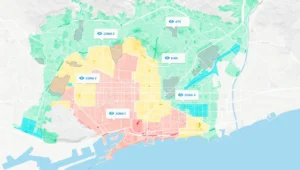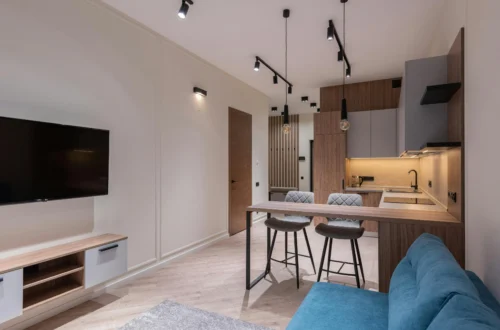Since April 3, 2025, any property owner wishing to use their home for tourist rentals must obtain the explicit authorisation of the community of owners. This means that even if there were no previous restrictions in the building, a request must now be submitted to the homeowners’ association and approved to operate legally.
This change stems from the Supreme Court ruling of October 7, 2024, which confirmed that homeowners’ associations have the power to ban tourist use of apartments if they secure the support of at least 60% of the residents. These changes have raised concern and uncertainty among many owners who, like you, rent out properties for tourism purposes.
If you own a property in the city of Barcelona, there are key differences in local regulations that you should be aware of. Keep reading to understand how this law may affect you and how to balance your rental activity with local regulations.
1. How Can Neighbours Ban Tourist Rentals?
In certain cases, neighbours can limit or even prohibit the use of apartments for tourism. The mechanisms they can use include the following:
- Review of Current Bylaws: If the community bylaws already prohibit tourist use, be aware that any neighbour may demand the immediate cessation of such activity.
- Calling a Homeowners’ Meeting: To discuss this matter, a meeting must be called. It can be initiated by the president, the administrator, or a group of owners representing at least 25% of the ownership shares.
- Horizontal Property Law: According to this law, established in 2019, to prohibit tourist rentals in a building, the neighbours must obtain a favourable vote from at least three-fifths of the property owners, based on ownership shares. In other words, a qualified majority (60%) is required to restrict or prevent tourist use of the apartments.

2. What Can I Do If They Want to Ban My Tourist Apartment?
The first step is to check that the prohibition has been made legally and correctly, verifying the points mentioned above. For the decision to be valid, it must be properly recorded in the meeting minutes and registered in the Land Registry. If you find yourself in this situation, don’t panic—try to defend your position by following these recommendations:
- Make sure everything is in order by confirming that your apartment has:
-
- A valid tourist license (HUT).
- An up-to-date habitability certificate.
- Permission for tourist use in the community’s bylaws.
- And that there are no open proceedings with the City Council.
-
- Talk to your neighbours: Communication is key, so try to listen to their concerns while also explaining your own situation with strong arguments. Keep in mind that dialogue often helps to avoid unnecessary conflict.
- Seek professional advice: If the situation doesn’t improve, look for specialised legal support in urban planning matters to help you understand the law and review community agreements.
Ultimately, if the community votes to prohibit tourist rentals in the building, you may challenge the decision through legal action.

3. What If My Apartment Was Already Used for Tourism?
If your apartment was already operating as a tourist rental before April 3, 2025, you can rest assured—the new regulations only affect those looking to start this business activity from that date onward. The new law is not retroactive, so properties registered before the cutoff date may continue operating as usual. Thanks to this provision, owners who have been compliant from the beginning can keep running their activity without being affected by the recent changes.
4. What Other Restrictions Can Neighbours Impose?
While a homeowners’ association can influence the tourist use of the property, it may also set additional restrictions that do not directly impact the commercial activity but do regulate certain aspects of community living. Below, we explore some of these restrictions, which must always be approved by the majority of residents and remain within the legal limits.
 Measures that may be proposed:
Measures that may be proposed:
- Regulation of common areas: The community may establish internal rules that, indirectly, affect users of tourist apartments. These measures could include restrictions on using the elevator for luggage or limiting access to terraces.
- Coexistence rules: It is likely that behavioural norms will be approved for all residents, such as nighttime noise control, guest entry regulations, or party bans.
- Neighbours may propose a financial adjustment for those with tourist apartments. This could mean a surcharge of up to 20% on the regular community fees.
- They cannot:
- Verbally prohibit you: Any prohibition must be documented in an agreement and properly registered if it involves changes to the bylaws.
- Deny entry to your guests: If your tourist apartment is legally registered, neighbours cannot restrict access to guests or block your business activity.
- Impose arbitrary financial penalties: Any surcharge or fine must be backed by an agreement approved at a homeowners’ meeting and must comply with current legal regulations.
However, keep in mind that all measures must be formally approved at a meeting and recorded in the minutes. As long as your rental activity is regulated and authorised, your right to rent remains valid.
5. Catalonia: Its Own Regulatory Framework
The Autonomous Community of Catalonia has its own authority over housing and tourism matters, which has allowed it to develop a specific legal framework to regulate tourist accommodations. Below is a summary of the key points:
- Communities cannot impose a full ban: In Catalonia, homeowners’ associations cannot completely prohibit tourist use of a property unless the bylaws are amended through a specific legal procedure. This amendment requires a qualified majority of 4/5 of the property owners during a specially convened meeting, as stated in the Catalan Civil Code (Article 553-11). Additionally, this 4/5 majority must also represent the same proportion in ownership shares.
- Specific Municipal Urban License: Since 2023, the HUTB (Habitatge d’Ús Turístic Barcelona) license has been mandatory, helping to create a legal and transparent environment for all stakeholders.
- Zoning through the PEUAT: The “Special Urban Plan for Tourist Accommodation” divides the city into different zones and regulates them according to their level of tourism impact.
As in the rest of Spain, in Catalonia, the homeowners’ association can establish coexistence rules through the internal regulations, which must align with the building’s bylaws, as established by Article 553-12 of the Catalan Civil Code. These internal rules regulate behaviour and promote good relations among residents, as well as the use of shared spaces and building facilities. The rules are binding for all users of the building, whether they are owners or not.
To modify the internal regulations or introduce new rules, the change must be agreed upon at a homeowners’ meeting. The modification can be approved by a simple majority of the owners present at the vote, as long as that majority also represents a simple majority of the ownership shares.

6. Tips for Maintaining Harmony with Your Neighbours
 Managing a tourist apartment goes beyond legal compliance—it also involves respectfully integrating into a residential community. If you’re a property owner and want to balance your activity with your neighbours’ well-being, here are some key tips to help you maintain a positive relationship and avoid conflicts:
Managing a tourist apartment goes beyond legal compliance—it also involves respectfully integrating into a residential community. If you’re a property owner and want to balance your activity with your neighbours’ well-being, here are some key tips to help you maintain a positive relationship and avoid conflicts:
- Open and proactive communication: Let your neighbours know about your activity and be available to address questions or unforeseen situations. This can help prevent misunderstandings and create a more relaxed atmosphere.
- Care for shared spaces: It’s essential to ensure that your guests respect common areas and keep them clean. This not only shows your concern for the community but also presents you as a responsible and professional host.
- Active collaboration with the community: Attending meetings and participating in neighbourhood decisions positions you as a committed owner. It also helps you stay informed and demonstrate cooperation with other residents.
- Responsibility: Handling any guest-related issues quickly shows that you are aware of your obligations and willing to take responsibility. Being proactive in managing your property and resolving problems reflects your professionalism.
- Conflict prevention: A friendly and proactive attitude is the best way to prevent the community from organising against tourist use.
Remember, prevention is always more effective than reaction. Maintaining a close and transparent relationship with your neighbours will help you avoid disputes and reduce the risk of measures that could impact your tourist rental.
We hope this article has been helpful in answering your questions about the legality and possible restrictions regarding tourist apartments. To read more useful articles on regulations, best practices, and advice, visit our blog for property owners.






